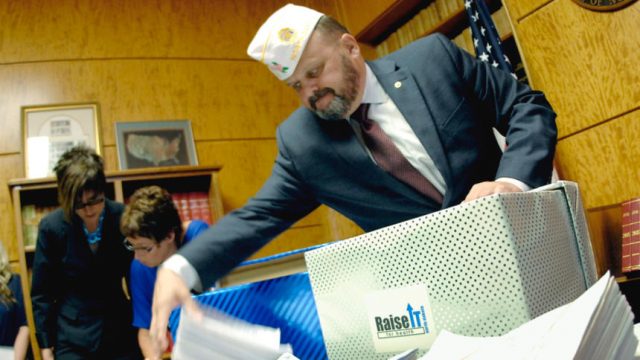LaFaive and Nesbit: There Will Be Harsh Consequences for Raising North Dakota’s Tobacco Tax

David Johnson, a member of the North Dakota Veterans Coordinating Council, unloads boxes filled with petition signatures for the tobacco tax initiative measure at the Secretary of State's office in the state Capitol Thursday morning in Bismarck. On the left is Kristie Wolff, with the American Lung Association in North Dakota and representing the Raise It for Health North Dakota group, is helped by LeAnn Oliver with the Secretary of State's office. 7-7-2016
The Nov. 8 North Dakota ballot initiative to raise cigarette excise taxes by 400 percent will — if adopted — increase cigarette smuggling and cause other unintended consequences.
We have studied cigarette evasion and avoidance (what we call “smuggling”) around the United States for a decade and have developed a statistical tool for measuring the degree to which cigarettes are smuggled across state and international borders.
Our model of smuggling — which uses data through 2014 — tells us that for every 100 cigarettes consumed in North Dakota, another 11.6 are smuggled out to other states, mostly neighboring ones such as Minnesota. There is no illicit inbound traffic.
We can run “what if” scenarios with our statistical model to estimate future smuggling rates based on proposed excise tax increases. We find that, after raising excise taxes to $2.20 per pack, North Dakota will stop being a cigarette “exporting” state. Instead, cigarettes smuggled into the state will become 16.6 percent of the total market. That is, of all the cigarettes consumed in North Dakota, more than 16 percent will have been smuggled in through one of two means: casual or commercial trafficking.
[mks_pullquote align=”right” width=”300″ size=”24″ bg_color=”#ffffff” txt_color=”#000000″]In 2013 a California man pleaded guilty for his work in trying to smuggle millions of cigarettes shipped from China to the Port of Newark in New Jersey. They were then shipped to California for distribution. If smuggling is profitable at those distances, imagine what profits await organized crime syndicates that send loads of cigarettes from Nebraska or Missouri to North Dakota.[/mks_pullquote]
Casual smuggling typically involves people buying less expensive cigarettes for personal consumption. They do this through online purchases or going to a different taxing jurisdiction, such as an Indian reservation or another state. Commercial operations, by contrast, involve long haul, large shipments from distant states such as Virginia or North Carolina.
With the current excise tax at 44 cents per pack, almost 100 percent of the North Dakota-related smuggling is casual. People in neighboring states drive across the border to buy smokes and return home. But under the higher tax scenario, most smuggling will be inbound, and commercial.
Our model compares legal tax-paid sales with reported smoking rates by state. The difference between the two must be explained, and we — and other scholars — attribute it to smuggling. The model also controls for important factors that may influence measurements, such as border county populations and the presence of Indian reservations.
The reservation variable is important because there are four tribes in North Dakota which may be a convenient source of lower-priced smokes. A 2014 National Bureau of Economic Research paper titled, “Reservation Prices: An Economic analysis of Cigarette Purchases on Indian Reservations” looked at this problem. It conducted a survey of 6,539 smokers that roughly 19 percent of them “always” buy their smokes on one of New York’s reservations.
Some states — such as Washington — try to minimize reservations as a source of cheaper smokes by negotiating tax compacts with their tribes. Such compacts typically require tribes to collect state-level excise taxes on sales to nontribal members. North Dakota has one such compact. We’re not yet sold on their efficacy. Taking away the incentive for consumers to shop on reservations just creates an incentive for individual tribal members to become a source of cheap cigarettes themselves.
The state of Washington’s tax compacts have still not prevented it from having high smuggling rates. We estimate its 2012 smuggling rate at 48 percent of the total market. Only three other states had higher rates that year. Would the absence of tax compacts have changed that fact? We’re not the only scholars to estimate smuggling rates. In 2015, a team of researchers hired by the United States Congress (and using data through 2012) published their own analysis and estimated Washington’s smuggling rate at 45.5 percent.
To give the reader an idea of how profitable the trade in illicit cigarettes is, consider one example. In 2013 a California man pleaded guilty for his work in trying to smuggle millions of cigarettes shipped from China to the Port of Newark in New Jersey. They were then shipped to California for distribution. If smuggling is profitable at those distances, imagine what profits await organized crime syndicates that send loads of cigarettes from Nebraska or Missouri to North Dakota.
The massive profits that await smugglers have inspired every other sort of mischief. In the highest profile (but not only) case of its kind, North Carolina men ran vanloads of cigarettes to Michigan and used part of their profits to support the Hezbollah, a known terrorist organization. At other times, cigarettes have been brazenly stolen by thieves who cut through the roofs or break through the walls of legal, cigarette wholesalers and retailers. Other thieves hijack trucks for their cargo of cigarettes. The list goes on.
Supporters of this initiative may mean well, but the costs associated with the tax increase may outweigh the benefits.
Todd Nesbitt co-authored this op/ed. He earned his doctorate in economics from West Virginia University in 2005 and is now a senior lecturer at the Ohio State University




